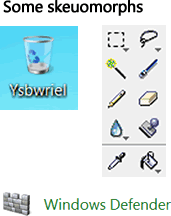Here’s a recording in a mystery language.
Can you identify the language, and do you know where it’s spoken?
Here’s a recording in a mystery language.
Can you identify the language, and do you know where it’s spoken?
It’s been in the news recently that Lidl supermarkets in the UK have a policy that their staff should speak only English to customers, irrespective of their native language in order to ensure that staff and customers “feel comfortable”. Apparently this is “for the benefit of all our customers as well as our staff to ensure a comfortable environment where all feel included.”
The only exception to this is if a customer doesn’t speak any English and a staff member can speak the customer’s language, then they can use that language.
Why anyone would feel uncomfortable or excluded when they hear people speaking other languages I don’t know. It’s not something that happens very often after all.
There has been outrage about this policy in Wales, where according the the Welsh Language Act of 2010, it is illegal to stop staff from speaking in Welsh.
This policy came to light after Polish staff at a Lidl in Kirkcaldy in Scotland were threatened with dismissal for speaking Polish to each other during their breaks and on the shop floor, even though they explained to their manager that many Polish-speaking customers, some of whom who speak little or no English, come to the store because they know that the staff speak Polish [source]. This appears in violation of Lidl’s policy, and could be bad for business.
[Addendum]
According to another report I found today, Lidl have clarified their language policy. They said that it was a “great asset” to have such a multi-lingual workforce, and:
“We understand that in certain regions of the UK there are other official languages in use and we welcome the use of these in our stores. We also ask that, if possible, our staff respond to customers in the language in which they are addressed. We absolutely aim to empower and encourage any staff members to use their language skills to assist customers.”
They also said that:
“staff were welcome to speak in their language of choice whilst on breaks, but asked that they consider colleagues who may be sharing the facilities.”

Yesterday I discovered that poodles were bred to hunt ducks and other water fowl in Germany, and that the word poodle comes from the German Pudel, an abbreviation of Pudelhund (water dog), from the Low German Pudel (puddle), from pudeln (to splash about) [source].
The English word puddle is derived from the Old English word pudd (ditch), and is related to the German pudeln.
A group of ducks on water is known as a paddling, team or raft of ducks – so you might see a paddling of dibbling ducks on a puddle puzzling a poodle.
Other collections words for groups of birds: http://baltimorebirdclub.org/gnlist.html and http://www.britishbirdlovers.co.uk/articles/collective-nouns-for-birds
Another duck-related word is dibble, which means “to drink like a duck, lifting up the head after each sip”. It also means “a small, hand-held, pointed implement for making holes in soil, as for planting seedlings and bulbs; to make holes (in soil) with a dibble; to plant with a dibble”, and is a slang word for a police officer – from Officer Dibble in the Top Cat cartoons [source].

I came across an interesting word and concept today – the skeuomorph [ˈskjuːəmɔrf], from the Greek σκεῦος (skéuos – container or tool), and μορφή (morphḗ – shape), and defined as “a derivative object that retains ornamental design cues from structures that were necessary in the original” [source].
This term was apparently coined by H. Colley March in 1889 after he noticed that some ancient artifacts had a retro look. For example pottery bowls had patterns like woven baskets [source].
Modern skeuomorphs include many digital icons and interface elements on computers and other electronic devices which resemble their non-digital analogues, such as the waste basket / trash can, clocks, shopping trolleys / carts, and so on.
Here’s a recording in a mystery language.
Can you identify the language, and do you know where it’s spoken?